Chilmeg Elden & Zhiyi Liu
The 19th International Pragmatics Conference (IPrA2025) was held at the University of Queensland, Brisbane, Australia, from 22 to 27 June 2025. This event was co-hosted by the local chairs Michael Haugh and Valeria Sinkeviciute, and the International Pragmatics Association. The special theme of IPrA2025 was Pragmatics in Action, with the aim to bring the notion of ‘action’ back to the forefront of pragmatics and encourage interdisciplinary exchange across the many (sub)disciplines with which pragmatics engages. The six-day conference involved seven plenary talks, one plenary panel, 60 panels over 141 sessions, 74 oral lecture sessions, and a poster session, which was delivered in hybrid mode and attracted approximately 600 in-person and 100 online participants from across the globe.
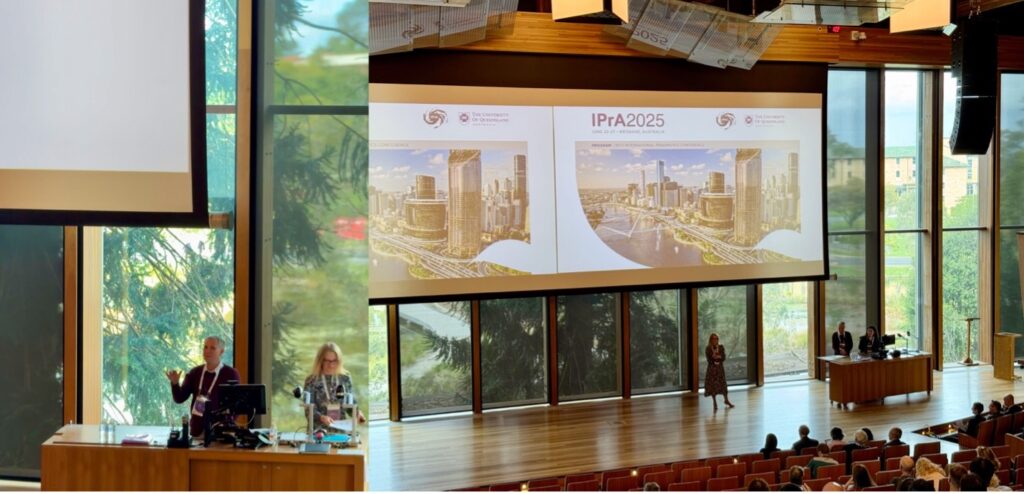
IPrA2025 co-chairs Michael Haugh and Valeria Sinkeviciute
This conference report is written from the combined perspective of conference participants and student volunteers. We would like to share our personal experiences of being part of IPrA2025, highlighting some of the talks and panels we were engaged in, and memorable moments.
Pre-conference workshops (21-22 June 2025)
This year, the traditional six-day main conference was preceded by two days of pre-conference workshops: three full-day sessions on Saturday (21 June) and six half-day sessions on Sunday (22 June). The workshops covered a variety of research methods and approaches in pragmatics, including, but not limited to, conversation analysis (CA), corpus linguistics, multimodal analysis, and computational approaches. Practical training was provided in the workshops, which attracted researchers from different stages to join and particularly offered a precise chance for postgraduate students and early-career researchers to learn and practice.
Personal reflection
With the strong interest in children’s talk-in-interaction, I was really looking forward to the full-day workshop Conversation analysis with infants, toddlers and young children, organised by Amanda Bateman. This workshop offered hands-on training on applying conversation analysis in childhood research. It began from the basics by introducing what CA is and why it works as an important and creative approach for childhood research. Practical questions, such as the role of the researcher when recording and transcription issues were raised, guiding all participants into a deep and engaging discussion. Olga Anatoli Smith also shared her experience with line drawing, providing a step-by-step instruction on how to do it using different devices and software, which I found extremely useful. I look forward to using the methods introduced by her to prepare images for my future publications. The data session was engaging and inspiring. We also discussed four pieces of data on adult-child talk in both classroom and family settings. It was my first opportunity to investigate children’s talk in classroom discourse hands-on, which I found challenging but very interesting.
——— Zhiyi
I participated in the workshop Corpus Pragmatics: Using Corpus Methods to Study Discourse and Pragmatics, organised by Matthew Gillings on Saturday. This hands-on session guided us through key techniques for analysing pragmatic aspects, such as (im)politeness variation in large-scale text data. It was a valuable experience for me to learn how corpus methods could complement qualitative approaches and to generate new ideas for analysing my own datasets. It was also eye-opening for me to find out the possibility of using those tools to analyse non-verbal features such as laughter. I walked away with new ideas to try with my datasets. Then on Sunday, I participated in the half-day workshop Pragmatics in Second Language Acquisition: From Theory to Practice organised by Wei Ren. The session guided us through the theoretical foundations, research methods, as well as trends in the field. As I have an interest in second language pragmatics, I found it particularly useful for reviewing important aspects of the field and gaining new perspectives on potential directions for future research.
——— Chilmeg
The main six-day conference (22-27 June 2025)
IPrA2025 featured an extensive program covering both core theoretical domains, such as speech acts, (im)politeness, variational and experimental pragmatics, as well as applied domains including healthcare/clinical communication and language education. A notable trend in the parallel sessions was the strong presence of technological integration, with popular panels on AI and computational methods in pragmatic analysis (e.g., AI Language and Computational Methods in Pragmatic Analysis organised by Xi Chen and Vittorio Tantucci), digital discourse, and human-AI communication. Cross-linguistic and intercultural perspectives were also prominent, with panels focusing on linguistic variation and comparative studies across a wide range of languages including Arabic, Chinese, Dutch, English, Finnish, French, German, Hebrew, Hindi, Indonesian, Italian, Japanese, Korean, Portuguese, Russian, Spanish, Swahili, Turkish, and Australian Indigenous languages.
Plenary lectures were held on day 1 (Sunday, 22 June), day 4 (Wednesday, 25 June), and day 6 (Friday, 27 June) of the conference. The opening day (Sunday) included the plenary panel on Australian Indigenous languages, three plenary talks, and the award ceremonies. Sunday’s plenary talks were given by Lifetime Achievement Award recipient William F. Hanks, Innovation Award recipient Terra Edwards, and IPrA Secretary General Jef Verschueren, who delivered his first plenary in nearly four decades of involvement with the association (Pragmatics for the public sphere: Meaning potential and the global challenges of adaptability).
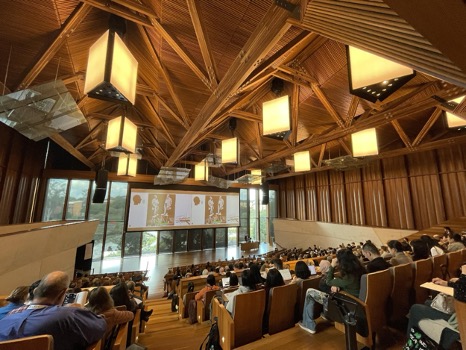
Jef Verschueren’s plenary talk
Monday (day 2) featured 18 panels across 27 sessions and 12 general oral sessions, while Tuesday (day 3) had 20 panels and 17 general oral sessions. Wednesday (day 4)’s plenaries were delivered by Kathleen Bardovi-Harlig on formulaic language in email communication (I hope this email finds you well: Formulaic language in pragmatics) and Melisa Stevanovic on the relationship between context and action in interaction (Slicing the Social World: Context and Action in the Analysis of Interaction).
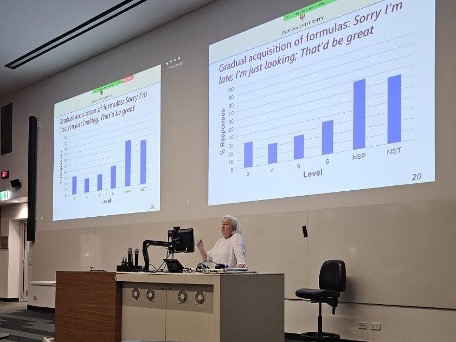
Kathleen Bardovi-Harlig’s plenary talk
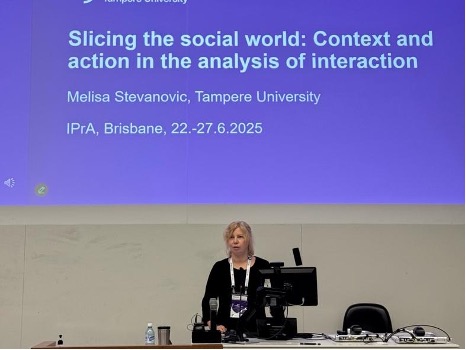
Melisa Stevanovic’s plenary talk
Thursday (day 5) was another busy day with 16 panels across 28 sessions, 13 general oral sessions, and a lively poster session after lunch. On Friday (day 6), the final day, 9 panels and 18 general oral sessions ran alongside two plenary talks: Chaoqun Xie on impoliteness in university interactions (The complexity of impoliteness: Emotion, power, and identity struggle) and Pilar Garcés-Conejos Blitvich on the metapragmatics of forgiveness in the post-digital age (Post-digital redemption? The metapragmatics of forgiveness).
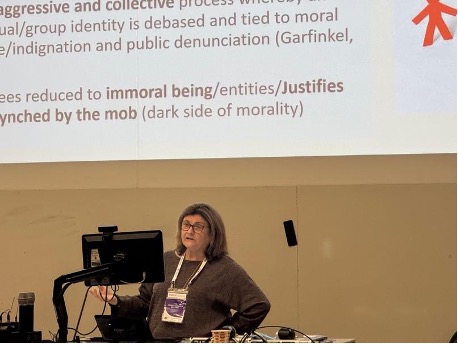
Pilar Garcés-Conejos Blitvich’s plenary talk
Personal reflections
As one of the presenters, I participated in the panel on family discourse (Cross-]linguistic studies on relationships and socialisation practices in family discourse) organised by Valeria Sinkeviciute (co-chair of IPrA2025) and Andrea Rodriguez. The schedule was fully packed with 12 presentations, covering various topics including, but not limited to, caring, (im)politeness, (in)appropriateness, social and moral socialisation, and doing ‘family’ in not only monolingual but also bi/multilingual families. I was surprised by the wide range of languages explored in this panel, including Japanese, Mandarin Chinese, Korean, Russian, Finnish, French, English, Italian, Dutch, and Australian Indigenous languages! As a PhD student, I was grateful for the opportunity to share my ongoing research with established and prominent researchers in the field and to receive valuable feedback and suggestions from the audience. It was also my first time participating in a panel closely aligned with my current research focus, and I was excited to hear inspiring talks from and communicate with researchers that I often cite in my work.
I also attended the panel Adult-child and peer interactions in transitional spaces organised by Matthew Burdelski and Amanda Bateman. This panel featured a series of interesting talks examining the linguistic and embodied resources used by both adults and young children in transitions. In her concluding remarks, the invited discussant, Susan Danby, offered some key take-home points and proposed several research possibilities, which I found particularly inspiring.
——— Zhiyi
I participated in the panel, Theorising conversational humour: Implications for pragmatics, organised by Nicholas Hugman, Michael Haugh (co-chair of IPrA2025) and Béatrice Priego Valverde, which explored the key issues in theorising conversational humour. Papers in this panel examined topics including the role of laughter, sequential organisation, multimodal dimensions, and the role of incongruity and shared knowledge, across various modes and contexts ranging from parliamentary debates and everyday interactions to online discourse. I personally found the paper on failed humour (RuPaul’s ‘angry black woman’: A tale of failed humour, microaggressions, and online racial discourse by Eleni Kapogianni and Chi-He Elder) particularly interesting, as it traced the interactional consequences of failed humour and demonstrated how (failed) humour can trigger or reflect moral judgement, both from the interactants and from the audiences, in this particular case around racial stereotyping, microaggressions, and accountability. As this was my first time taking part in a panel, I especially valued this opportunity to gain insights closely aligned with my research interests. Although it was a relatively small panel running for half a day, I was very excited to see the room packed and the discussion at the end so engaging and lively. I really wish there was more time to expand the discussions further, and I am excited to see more empirical studies in the future that further connect the theoretical discussions with the variety of ways conversational humour is constructed and negotiated across contexts and languages.
——— Chilmeg
Conference directions and closing
On Wednesday (25 June), following the two exciting plenary talks, the IPrA General Assembly was preceded by an address from the current IPrA president, Marina Sbisà. During the assembly, Jef Verschueren announced the decision regarding the transition of the IPrA Secretariat. Mieke Vandenbroucke will assume the role of Secretary General from the end of 2025.
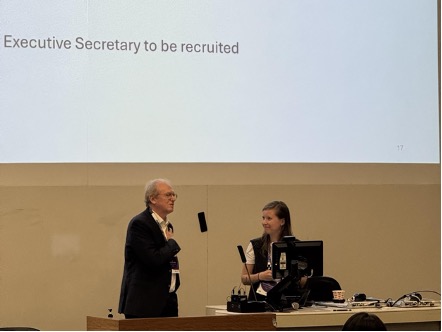
Jef Verschueren and Mieke Vandenbroucke
Another important announcement was also made – the 20th International Pragmatics Conference (IPrA2027) will go to Finland and be held at the University of Helsinki. The special theme of this forthcoming edition is Building Bridges. Important dates were also announced: IPrA2027 will be held between 27 Jun-2 Jul 2027, and the Call for Papers will start in March 2026.
The six-day conference flew by. At Friday’s closing, participants remained in high spirits, expressing their appreciation for the organisers and their enjoyment of the week-long, in-depth academic discussions. It’s time to look forward to IPrA2027 in Helsinki, Finland!
A milestone and a special moment
IPrA2025 was a special milestone for us, not only as the local host organisation, but also because it marked the 40th anniversary of IPrA. Jef Verschueren and Ann Verhaert have guided the association with their extraordinary dedication for the last 40 years, and after 2025, they will be stepping back to work behind the scenes. As a first-time participant and a student volunteer who witnessed and took part in the behind-the-scenes work prior to and during the conference, I was deeply inspired and moved by their long-standing commitment and grateful for such a warm and vibrant community they have established and maintained over so many years. After my first IPrA, I feel as though I have found another academic ‘home’ and ‘family’, which I am excited to stay connected with in the many years to come.
In recognition of this milestone and special occasion, a series of photographs, videos, and messages was gathered from the IPrA community to mark 40 years of IPrA and to thank Jef and Ann for their extraordinary dedication over the decades. It was an extremely moving moment, even as a first-time participant, to see the depth of appreciation and affection expressed by the IPrA community, and to witness how much their work and dedication have meant to so many scholars from around the world.
——— Chilmeg
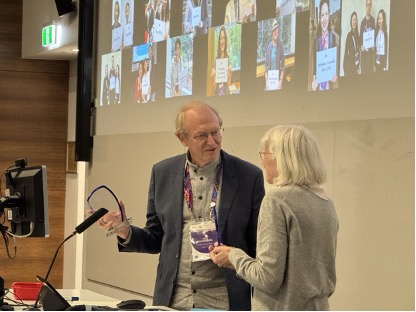
Jef Verschueren and Ann Verhaert and ‘When was your first IPrA?’ photos on the screen
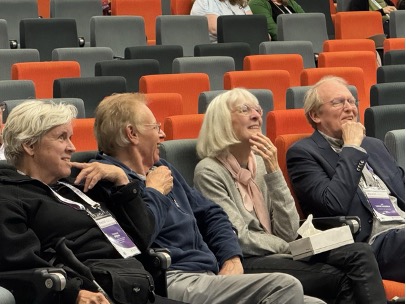
Penelope Brown, Steven Levinson, Ann Verhaert and Jef Verschueren watching the video messages
Closing Remark
As PhD students and early-career researchers who were involved in organising the conference, IPrA2025 was a truly memorable experience that inspired and motivated us even further in our interest in pragmatics research. It was an exciting opportunity to engage with work across the many (sub)disciplines of pragmatics and to meet in person so many researchers whose names we had previously only encountered in publications. We are extremely thankful to the members of the International Pragmatics Association, especially Jef, Ann and Mieke, as well as to our supervisors who served as the co-chairs, for giving us this amazing opportunity to take part in the organisation of such an important event for the pragmatics research community. It not only provided us with the opportunity to present to and gain insights from leading scholars from around the world, but also to gain valuable experience in the practical aspects of conference organisation, from logistics to networking. Although the organisation of such an important event was undoubtedly demanding and tiring, it was an immensely rewarding and invaluable experience. We believe IPrA2025 was a great success, and we are already excited for IPrA2027 in Helsinki, Finland.
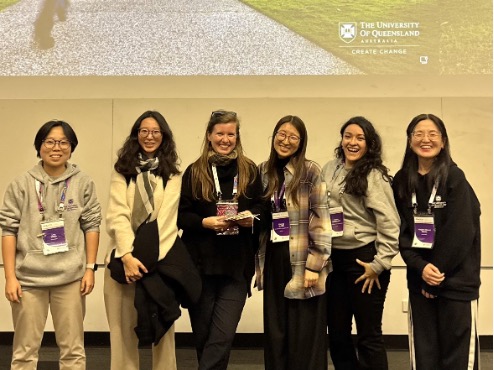
Some of the student volunteers and Mieke
